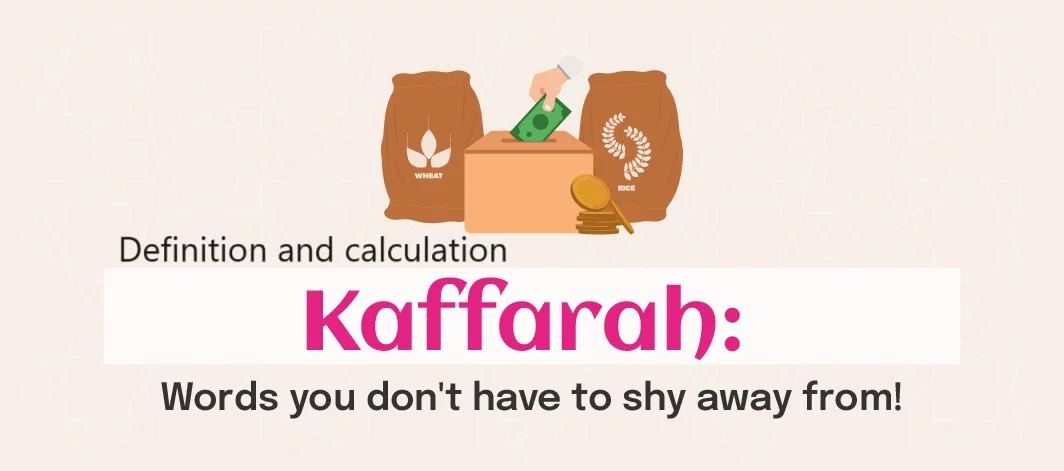Kaffarah in Islam refers to the mandatory expiation required for certain violations in Islamic law or religious obligations. It is a form of atonement through which a person seeks forgiveness and makes amends for the violation committed.
Pay Kaffarah Online with Cryptocurrency

Kaffarah(Expiation) can take various forms, such as fasting, feeding the poor, or giving monetary compensation. The type and amount of kaffarah required depend on the nature of the violation committed and the circumstances of the individual.
The purpose of kaffarah is to purify onesf from sin, seek forgiveness from Allah, and restore one’s relationship with Him. It is not intended as a form of punishment but rather as a means of making amends and seeking forgiveness.
The concept of expiation in Islam is closely related to the idea of repentance (tawbah), which involves acknowledging one’s wrongdoing, feeling remorse, and making a commitment to change one’s behavior. Expiation is seen as a necessary step in the process of repentance and seeking forgiveness from Allah.
Kaffarah is an essential concept in Islamic jurisprudence, and its practice is based on the teachings of the Quran and the Sunnah (the actions and sayings of Prophet Muhammad). It serves as a reminder of the importance of following Islamic law and fulfilling religious obligations. Overall, kaffarah is a way to seek forgiveness and make amends for violations committed, purify oneself from sin, and restore one’s relationship with Allah.
Quranic Verses:
“And whoever does that in aggression and injustice – then We will soon cast him into a Fire. And that, for Allah, is [always] easy. If you avoid the major sins which you are forbidden, We will remove from you your lesser sins and admit you to a noble entrance [into Paradise].” (Quran 4:30-31)
“And if any of you is ill or has an ailment in his scalp (necessitating shaving), (he should) in compensation either fast, or feed the poor, or offer sacrifice.” (Quran 2:196)
here is a detailed explanation of the amount and type of payment required for each mandatory expiation (kaffarah) in Islamic jurisprudence:
- Kaffarah for breaking an oath (yamin): The kaffarah for breaking an oath is to fast for three consecutive days, feed ten poor people, or clothe them. If a person cannot do any of these, then they must fast for three days. The amount of food to be given to each poor person is half a sa’ (approximately 1.5 kg) of wheat, barley, dates, or any other staple food of the region.
- Kaffarah for breaking a fast (sawm): The kaffarah for breaking a fast during Ramadan is to fast for sixty consecutive days or feed sixty poor people. If a person cannot do either of these, then they must feed one poor person for each day of fasting that they missed. The amount of food to be given to each poor person is one mudd (approximately 750 grams) of wheat, barley, dates, or any other staple food of the region.
- Kaffarah for killing an animal (dam): The kaffarah for killing an animal without a valid reason is to either free a slave, fast for sixty consecutive days, or feed sixty poor people. If a person cannot do any of these, then they must fast for sixty days. The amount of food to be given to each poor person is one mudd (approximately 750 grams) of wheat, barley, dates, or any other staple food of the region.
- Kaffarah for having sexual relations during the day in Ramadan: The kaffarah for having sexual relations during the day in Ramadan is to either fast for sixty consecutive days or feed sixty poor people. If a person cannot do either of these, then they must feed one poor person for each day of fasting that they missed. The amount of food to be given to each poor person is one mudd (approximately 750 grams) of wheat, barley, dates, or any other staple food of the region.
- Kaffarah for consuming usury (riba): The kaffarah for consuming or dealing with usury (riba) is to give up all profits made through usury and also make an additional payment equal to the amount of the original transaction to a charitable cause.
- Kaffarah for abandoning the obligatory prayers: The kaffarah for continuously abandoning the obligatory prayers without a valid excuse is to repent and make up all the missed prayers, as well as perform additional acts of worship and good deeds to seek forgiveness from Allah. It is important to note that abandoning the obligatory prayers is a serious violation in Islam, and it is essential to take steps to make up for the missed prayers and seek forgiveness from Allah. The focus should be on repentance and making a sincere effort to improve one’s relationship with Allah and fulfill one’s religious obligations.
It is important to note that the amounts and types of payment mentioned above may vary depending on the circumstances and the region. However, the basic principle is to provide enough food or other forms of payment to fulfill the obligation of kaffarah and seek forgiveness from Allah.
Wallet to Wallet
A new feature for paying your donations. With this method you can pay your donations directly from your wallet or exchange to another wallet instead of using online gateways. Try it now.






